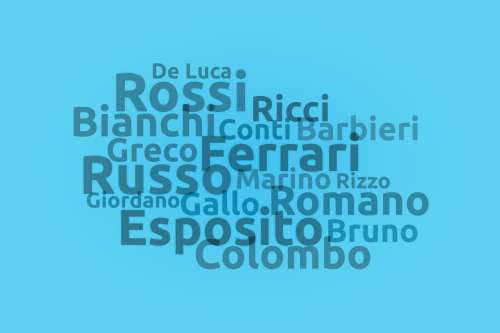While it can be difficult to pinpoint an exact number, a national community survey conducted in 2015 estimated there were 18 million Americans who identified as Italian American. Other data collected by the U.S. Census Bureau since 2000 has also placed estimates of around 18 million, But, no matter the number, there are a lot of Americans who identify culturally either partially or entirely as Italian.
Some of the most famous Italian Americans include Frank Sinatra and Giada De Laurentiis. Robert Dinero, Last Gaga (Stefani Germanotta), Joe Dimaggio, and the infamous Al Capone. The New York metro area, including New Jersey and Connecticut, is where you can find the largest population of those who identify as Italian. Still, Philadelphia, Boston, and Chicago are all home to over half a million Italians each, with L.A. close behind.
Italy did not become a unified nation until the 19th century, but Italy’s culture goes back to the home of one of the most influential and ancient empires the planet has ever seen, the mighty Roman Empire.
After the fall of the Roman Empire, Italy primarily functioned well as a collection of city-states run by lesser princes and high-ranking families. In fact, the Italians are credited with bringing the Renaissance and Age of Enlightenment to the rest of Europe and pulling the continent out of the Middle Ages.
Italy has long been known for its artistic, cultural, musical, and scientific contributions to the world, so it’s no wonder those with Italian heritage take pride in their ancestral country. After all, where would we be without DaVinci, Michelangelo, and Galileo?
Along with the Italian Renaissance also came the use of Italian surnames. During this time, parish priests were tasked with registering their parishioners and needed ways to identify one Antony from the next. Thus the introduction of the Italian last name.
Italian Patronymic Surnames
Italian patronymic surnames are a type of familial identifier, inherently derived from the personal name of a male ancestor. This practice of surname creation is prevalent in various cultures worldwide, but in an Italian context, it often involves the suffix "-i" added to the name of a person's father or another male predecessor. For instance, if a person's father was named 'Giovanni,' their surname might be "Giovannini", denoting him as the "son of Giovanni".
- Adami - Son of Adam.
- Agosti - Son of Agosto.
- Alfonsi - Son of Alfonso.
- D’Amico - Son of a friend.
- D’Angelo - Son of Angelo. Another variation of this name is D’Angeli.
- DeLuca - One of the oldest family names, it has its root in the Latin name Lucas. This surname first appeared in the 14th century when Ludovico Luca became governor of Barletta. It was then used to mean son of Luca or descendant of Luca.
- DeSantis - Santis refers to the Latin word for holy or devout. A name given to the ancestors of a religious man.
- DiMaggio - The eldest son.
- Messina - The middle child.
Italian Occupational Surnames
Italian occupational surnames are a unique category of last names that originated from the professions or jobs of individuals. These surnames were often used to identify individuals based on their trade or craft. For instance, surnames such as "Ferraro" (related to a smith or a blacksmith), "Pastore" (meaning shepherd), or "Contadino" (meaning farmer) are indicative of the occupations held by the ancestors of those bearing these names today.
- Abate - Derived from the Latin word for priest.
- Ajello - Field. A name commonly given to farmers.
- Bonetti - Hatmaker.
- Capo - Head, chief, or boss. Variations of this last name include Caputo and Capone.
- Carbone - Coal or charcoal.
- Caruso - Boy. A name often given to a young apprentice.
- Cattaneo - Captain.
- Conte/Conti - Companion of the count. A likely name given to someone who worked for a count or on their estate.
- Coppola - This name means little hat in the Neapolitan dialect and was a name given to hat makers.
- Fabbri - Craftsman.
- Farina - Flour. A name for a baker.
- Ferrari - Stems from the Latin word ferro for iron and references someone who was a blacksmith. The name is now synonymous with fast, luxury cars.
- Pesci - Fisherman.
- Saccone - A maker of bags.
- Sartorre - Tailor.
- Uberti - Manufacturer.
- Verga - Shepherd.
- Zappa - Worker or laborer.

Lake Albano, Italy
Italian Physical or Personality Trait Names
Italian names often carry strong physical or personality trait connotations. For instance, "Bello" translates to "beautiful" or "handsome"; "Forte" means "strong", often used to signify physical strength or resilience; "Bruno" indicates a "brown" color, usually referring to someone with brown hair or eyes. On the personality trait side, "Allegro" translates to "cheerful" or "joyous", while "Fiero" signifies "proud," and "Saggio" denotes "wise".
- Agosti - Favored with good omens.
- Amato - Stems from the Latin word amatus and means dear one or beloved.
- Barone - Brave.
- Bellagamba - Beautiful leg.
- Bernardi German and Anglo Saxon roots this name means strong as a bear.
- Bertelli - Intelligent.
- Bianchi - White. This name was given to those very fair-skinned or blond.
- Bianco - White. A variation of Bianchi was used for pale-skinned individuals.
- Bruno - Even though your kids will tell you we don’t talk about Bruno, this Italian surname refers to those with dark or tan skin. Bruni and Brunaldi are two variations.
- Colombo - Dove. It was a name often assigned to orphans.
- Esposito - One of the most common Italian last names, it was often given to orphans.
- Gallo - This last nae comes from the Latin word gallus which means cock or rooster. It was likely a nickname for someone with a cocky or bombastic attitude.
- Gentile - A person with good manners.
- Grasso - Fat. An unfortnate last name but one with a simple meaning. Referred to a person who was overweight or stout.
- Longo - Tall or long.
- Mancini - One who is ambidextrous, possibly left-handed.
- Morelli - Dark hair or dark complexion. A name associated with the Moors.
- Ricci - Curly hair.
- Rosa/Rose - Red. Also refers to the flower.
- Rossi - This surname means red. It could refer to red hair or a reddish complexion. It is among the most common Italian surnames.
- Russo - Red-haired.
- Sala - Hebrew origins. It means gentle or peaceful.
- Valentino - Brave or courageous.
Italian Toponymic Last Names
Italian toponymic surnames, also known as locative surnames, originate from geographical locations and were often used to identify someone based on their place of residence or birth. These surnames could be derived from a town, city, region, or even a specific landmark. Examples include "Roma" (indicating origin from Rome), "Milano" (originating from Milan), or "Napolitano" (from Naples). Further, surnames like "Conti di Modica" indicate nobility and ownership of a specific region or town.
- Costa - A name given to someone who lived near the coast.
- Fiore - Flower. Could refer to people who lived near flower fields or who possibly worked in the fields.
- Fontana - Water source or fountain.
- Giordano - This name references the river Jordan and has religious connotations.
- Greco - This last name means Greek. Considering Italy’s close proximity to Greece there was often a lot of trade and immigration between the two countries.
- Lombardi - This last name refers to people who came from the Northern Italian region of Lombardy.
- Marino - Ths popular Italian last name means of the sea.
- Monti - Mountain.
- Pagano - Village dweller.
- Pisano - Someone from Pisa.
- Riva - Near the river.
- Romano - One from Rome.
- Silvestri - Someone who lives near or in the woods.
- Tarantino - Refers to the town in Southern Italy, Taranto.
- Vinci - A name for people from central Italy near Tuscany or Florence. It’s how Leonardo da Vinci got his last name!
Common Italian Last Names
Italian last names, or "cognomi", offer a captivating glimpse into the country's rich culture and history. The following are some of the most common Italian surnames and their meanings.
- Amante - This Italian surname translates to "Lover" in English. It may have been used to denote a person who is passionate or romantic.
- Artino - The exact meaning is unclear, but it could be related to the Italian word "arte" meaning "art", indicating a possible connection to artistic pursuits.
- Bella - This Italian surname translates to "Beautiful" in English. It could have been used to describe a person of exceptional beauty or charm.
- Bianchi - Comes from the Italian word "bianco," meaning "white." Like Rossi and Russo, this could have been a nickname related to a person's physical appearance.
- Bruno - Comes from the Italian word for "brown." It may have originally been a nickname for someone with brown hair or a dark complexion.
- Colombo - Means "dove" in Italian. It could have been a nickname for a peaceful person, or for someone who lived at a house with a sign of a dove.
- Esposito - Traditionally given to children who were abandoned or given up for adoption, as it comes from the Latin "expositus," meaning "exposed" or "abandoned."
- Ferrari - Derived from "ferro," the Italian word for "iron." This surname could have been used for someone who worked with iron, such as a blacksmith.
- Marino - Derived from "marino," meaning "of the sea." It could have referred to a sailor, a fisherman, or someone who lived near the sea.
- Ricci - Means "curly" in Italian. It was probably a nickname for someone with curly hair.
- Romano - Means "Roman" in Italian, so it was likely used for someone from Rome or someone who lived in a place called Romano.
- Rossi - Derived from the Italian word "rosso," meaning "red." It was likely originally a nickname for someone with red hair or a ruddy complexion.
- Russo - Similar to Rossi, Russo also comes from a word meaning "red." In this case, it's from the Southern Italian variant.

